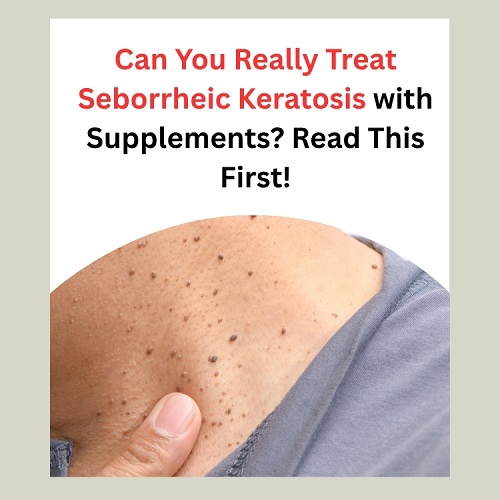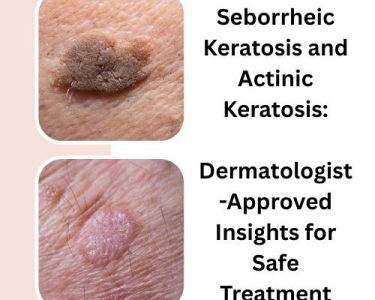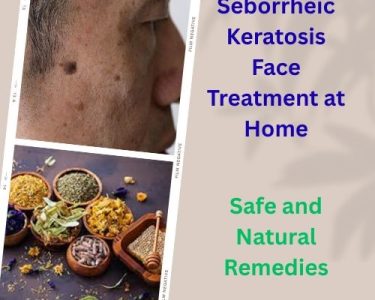Seborrheic keratosis is a common, non-cancerous skin condition that tends to appear with age. These waxy, wart-like growths might look alarming, but they are usually harmless. While conventional medicine often recommends cryotherapy, curettage, or laser therapy to remove them, many people are now exploring Natural Remedies for Seborrheic Keratosis, hoping for gentler, non-invasive alternatives.
But can supplements — especially herbal ones — truly help treat seborrheic keratosis? The science and nature of seborrheic keratosis, review promising herbal supplements for seborrheic keratosis, and explore natural solutions that may offer relief or prevention.
Understanding Seborrheic Keratosis: What Is It?
Seborrheic keratosis (SK) is a benign skin growth that can range in color from light tan to dark brown or black. These lesions typically appear on the face, chest, shoulders, or back. Their waxy, scaly, and slightly elevated appearance often leads people to mistake them for skin cancer — especially melanoma. However, SK is not dangerous.
Common Causes and Risk Factors
Though the exact cause of seborrheic keratosis remains unknown, experts believe the following factors play a role:
- Genetics: Family history increases your risk.
- Age: More common in people over 50.
- Sun exposure: Chronic UV exposure may contribute.
- Skin friction: Repeated rubbing or irritation can encourage growth.
While there is no cure for seborrheic keratosis, many seek to control or reduce lesions — and that’s where natural approaches come into play.
Why Natural Remedies for Seborrheic Keratosis Are Gaining Attention
In recent years, interest in natural remedies for seborrheic keratosis has surged. People are increasingly skeptical of invasive procedures or harsh chemicals, and instead turning to gentler, plant-based alternatives.
Here’s why natural remedies are becoming more popular:
- Fewer side effects than surgical treatments
- Cost-effective, especially for widespread or recurrent lesions
- Holistic benefits beyond skin health (e.g., immune support)
- Preference for organic or chemical-free skincare
But while going the natural route has its appeal, it’s important to set realistic expectations. Supplements and herbal treatments may not “cure” seborrheic keratosis, but they might help reduce inflammation, improve skin appearance, and prevent new lesions from forming.
Best Natural Remedies for Seborrheic Keratosis
Below are some of the most talked-about natural remedies for seborrheic keratosis, including herbal treatments, oils, and lifestyle strategies. Many of these aim to support skin health and address underlying causes such as oxidative stress and inflammation.
1. Apple Cider Vinegar (ACV)
One of the most commonly used at-home remedies for seborrheic keratosis, apple cider vinegar is believed to work by drying out the growth, eventually causing it to fall off.
- How to use: Soak a cotton ball in diluted ACV and apply it to the lesion daily for several weeks.
- Caution: Can cause skin irritation; always patch-test first.
2. Tea Tree Oil
With its antimicrobial and anti-inflammatory properties, tea tree oil is often used as a topical remedy.
- Application: Mix a few drops with a carrier oil and apply directly to the lesion.
- Note: Pure tea tree oil may be too strong for sensitive skin.
3. Castor Oil and Baking Soda
This old folk remedy involves creating a paste from castor oil and baking soda, which is said to gradually reduce the size of the keratosis.
- How to use: Apply the paste to the lesion, cover overnight, and rinse in the morning.
- Effectiveness: Anecdotal, but many swear by it.
4. Aloe Vera Gel
Known for its soothing properties, aloe vera may not remove seborrheic keratosis but can reduce irritation or redness around the lesion.
- Use: Apply fresh aloe gel directly to the lesion.
- Benefit: Helps with itching and inflammation.
5. Vitamin E Oil
Vitamin E is a powerful antioxidant that supports skin repair and regeneration.
- How to apply: Puncture a vitamin E capsule and apply the oil to the affected area.
- Benefit: May help fade lesions over time and improve skin texture.
Herbal Supplement for Seborrheic Keratosis: Do They Work?
The use of herbal supplements for seborrheic keratosis is a relatively new but growing area of interest. These supplements often work by reducing oxidative stress, improving immunity, and supporting skin health from within.
Let’s take a look at some of the most researched and promising herbal ingredients:
1. Turmeric (Curcumin)
Curcumin, the active compound in turmeric, is a potent anti-inflammatory and antioxidant.
- Benefits: Reduces inflammation and may inhibit abnormal skin growth.
- Form: Capsules, teas, or golden milk
- Bonus: Supports liver detox, which is linked to clearer skin.
2. Milk Thistle
Often used to detoxify the liver, milk thistle may help improve skin clarity and reduce the appearance of growths.
- Action: Encourages toxin elimination, reducing skin stress.
- Dosage: 150–300 mg of standardized extract per day.
3. Green Tea Extract
Rich in polyphenols, green tea is known for its skin-protective and anti-aging effects.
- Mechanism: Fights free radicals that damage skin cells.
- Use: Oral supplements or topical formulations.
4. Gotu Kola
Gotu Kola is a revered herb in traditional Ayurvedic and Chinese medicine, known for promoting skin healing.
- Benefits: Stimulates collagen production and skin regeneration.
- Form: Available in capsules, teas, and creams.
5. Burdock Root
Burdock root supports blood purification and is often used in traditional medicine to treat skin conditions.
- Function: Detoxifier and anti-inflammatory agent
- Form: Tinctures, capsules, or teas
6. Dandelion Root
Another liver-friendly herb, dandelion root is thought to improve skin health by helping remove excess toxins from the body.
- Benefit: Promotes clear skin and may reduce new lesion formation.
- Tip: Combine with milk thistle for enhanced detox support.
Top Herbal Supplements for Seborrheic Keratosis on the Market
If you’re not into brewing your own teas or mixing herbs, several commercial products combine many of the ingredients above into convenient capsules or powders.
Here are a few noteworthy formulations (always consult a doctor before starting):
- Nature’s Way Burdock Root
- Gaia Herbs Turmeric Supreme
- Himalaya LiverCare
- NOW Foods Milk Thistle Extract
- Solaray Gotu Kola Capsules
These herbal supplements for seborrheic keratosis won’t work overnight, but they may support the body’s ability to manage or reduce the appearance of skin growths over time.
Diet and Lifestyle: Critical to Natural Skin Healing
Supplements work best when combined with a healthy lifestyle. If you’re serious about natural remedies for seborrheic keratosis, focus on these foundational habits:
1. Eat a Skin-Healthy Diet
Include foods rich in:
- Antioxidants (berries, leafy greens, nuts)
- Omega-3s (flaxseed, chia seeds, fatty fish)
- Vitamin A, C, and E (carrots, citrus, almonds)
- Zinc and selenium (pumpkin seeds, Brazil nuts)
2. Stay Hydrated
Dehydration affects your skin’s ability to detoxify. Aim for 8+ glasses of filtered water daily.
3. Manage Stress
Chronic stress leads to systemic inflammation, which can worsen skin conditions. Try yoga, deep breathing, or journaling.
4. Get Regular Exercise
Exercise improves circulation, delivering nutrients to the skin and accelerating detoxification.
What Science Says: Limitations of Natural Treatments
While the anecdotal evidence supporting natural remedies for seborrheic keratosis is compelling, clinical studies are limited. Best Herbal Supplements Products and Natural Remedies -based approaches are not FDA-approved for treating seborrheic keratosis specifically.
Things to Keep in Mind:
- Natural remedies are not a substitute for professional diagnosis.
- Not all growths that look like SK are benign. Rule out skin cancer first.
- Supplements can interact with medications — consult your doctor before use.
- Effects can be slow or subtle, requiring consistency over weeks or months.
When to See a Dermatologist
If your growths:
- Change color or shape
- Itch, bleed, or become painful
- Multiply rapidly
- Cause emotional distress
…then it’s time to consult a dermatologist. They can confirm the diagnosis and recommend safe removal options if necessary.
Related Article: Natural Remedies for Seborrheic Keratosis at Home
Final Thoughts: Are Supplements Worth Trying for Seborrheic Keratosis?
The idea of treating seborrheic keratosis with herbal or dietary supplements is appealing — especially for those seeking gentler alternatives to surgery or chemical treatments. While the science is still catching up, many users report improved skin health and reduced lesion prominence after using natural remedies for seborrheic keratosis and incorporating a herbal supplement for seborrheic keratosis into their daily routine.
If you’re considering this path:
- Start with safe, well-known herbs like turmeric, milk thistle, and green tea.
- Be consistent — natural treatments often require patience.
- Prioritize overall health, not just symptom treatment.
- Always consult your healthcare provider before beginning any supplement regimen.
With the right combination of diet, supplements, and skin care, you may be able to support your skin naturally — and even prevent new growths from forming.




